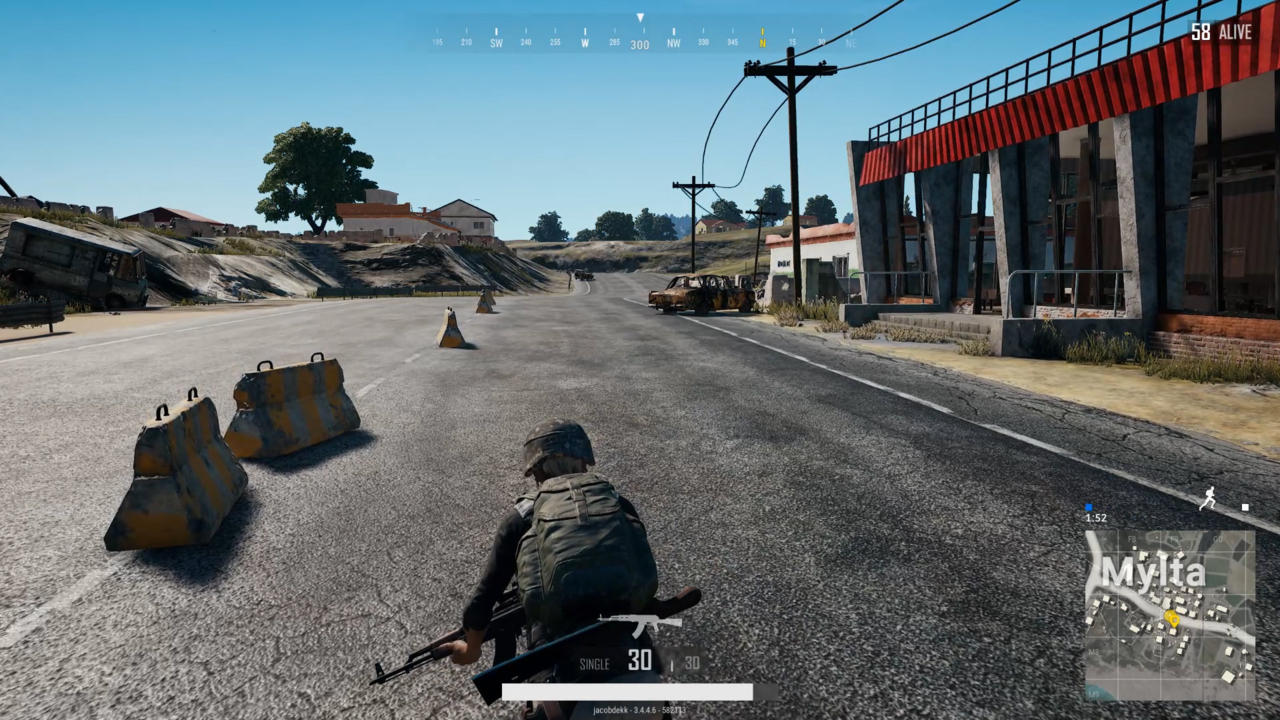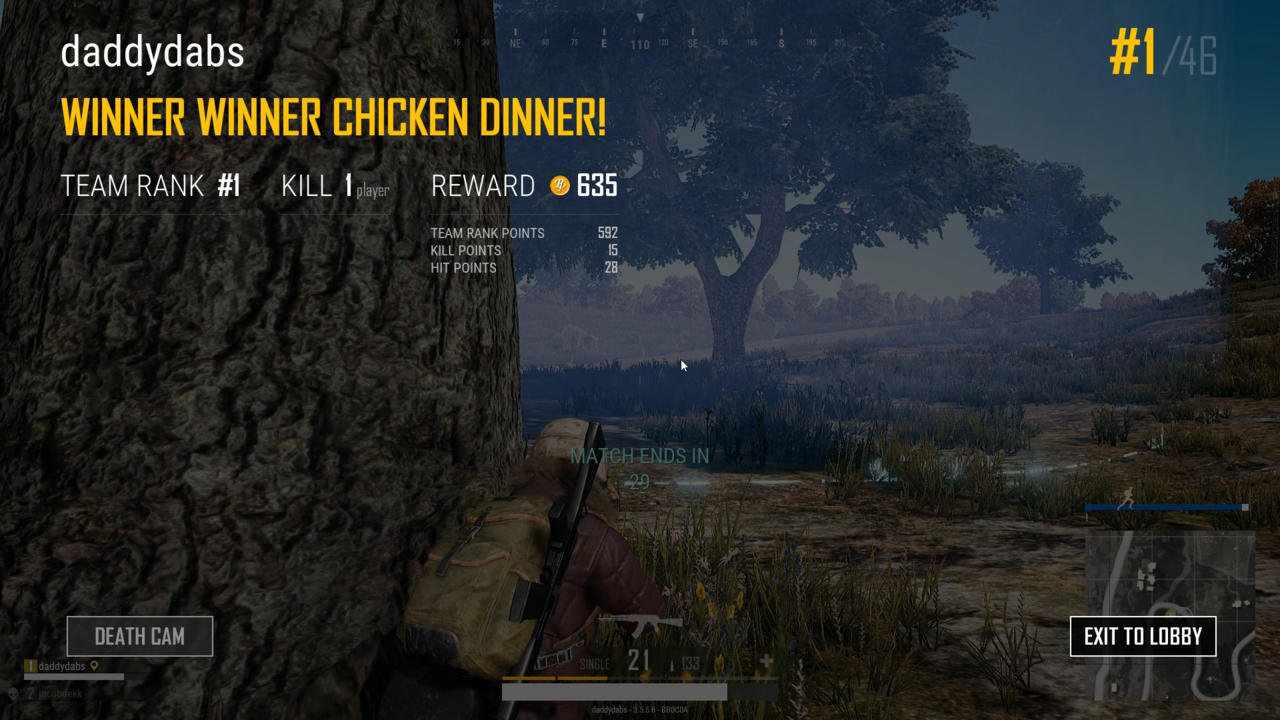You know what's a great idea? Stuffing 100 players into a plane to parachute down onto a desolate island to scavenge for weapons, armor, and supplies in hopes of surviving a bloody deathmatch. And to keep things interesting as numbers dwindle, throw in the impending doom of an electric field that forces players into an ever-shrinking warzone. PlayerUnknown's Battlegrounds turns this foreboding gameplay concept into an exhilarating multiplayer shooter. With several randomized variables that challenge you to adapt, no two matches are the same, and it's what keeps you coming back for more. It's not the first of its kind, and despite glaring flaws, PUBG emerges as the most accessible, mechanically refined battle royale game to date.
PUBG stands above its forebears by streamlining systems and mechanics to let you focus on gearing up, devising tactics on the fly, and executing them to the best of your ability. Gone are granular gameplay elements like crafting, bleeding, and the arduous navigation from games of this lineage. Jumping into a match is less daunting and faster paced than something like H1Z1: King of the Kill or earlier Arma II mods that Brendan "PlayerUnknown" Greene himself helped create.
Whether solo or with a squad of other players, the early phase of a match is filled with tense anticipation. Dropping out of an aircraft with just the clothes on your back, you're expected to loot for weapons, ammo, armor, and health packs. These critical items litter the city centers, towns, and abandoned structures across the game's two different maps. You have to account for the plane's flight path and determine if you want to pick a fight as soon as possible; if so, it's a race to find the first gun or immediately throw hands in a hilariously janky boxing match. On the flip side, parachuting to a more distant town results in a less stressful hunt for items; either way, you won't always get the gear you want. In squads, sharing an abundance of ammo and health packs or helping scout for a vehicle highlights the tactical advantage of team play in the opening minutes.

It's absolutely necessary to juggle all of these factors in the early phase of a match, and by the same token, this can prove to be exhausting and repetitive. Despite having relatively smooth inventory management, it's demoralizing to spend a majority of a match gearing up only to lose in the first firefight or die unceremoniously by distant gunfire coming from an undetermined direction. The harsh reality is part and parcel of the give-and-take you have to accept in PUBG for the more rewarding moments to surface.
After working through the hectic opening of a match, you then have to face the dread of engaging others while also keeping an eye on the slow yet ominous "blue circle of death" that forces players into an increasingly smaller zone. It gives you time to scavenge regardless of the area you land in, but the random nature of where the circle converges within a huge map ensures that no one strategy can be employed repeatedly. Whereas capture zones and specific choke points dictate the action in many shooters, PUBG leverages simple variables to stave off monotony.
You never know where the final firefight will take place, or which position will be most advantageous when things heat up, until the blue zone comes into view. One match could have the last 10 players fighting on the open shores and in between rock formations, and the next one could turn into a stalemate between squads holed up in buildings. Miramar, the newer desert map, showcases the evolution of PUBG with its more varied terrain, newfound verticality, and quirky touches to city interiors (like a luchador wrestling ring and a casino floor). Regardless of the map, the same rules and tactics apply, and it's up to you to adapt to the given environment.
Positioning, scouting, and knowing when to engage are vital to success; these are tenets that feed into the emergent tactics formed in the matter of seconds that separate life and death, especially when playing in groups. Imagine a skirmish against another squad across a crowded city. Spotting enemy movement presents an opening for a kill that'll turn the tide, but taking action puts you in potential danger. So do you pursue the enemy and brace for bullets raining down on you, or fire from afar and give your position away? If you take enough damage and get knocked down, teammates can revive you before you bleed out, but they'd be defenseless as the revive countdown ticks. PUBG is a series of calculated risks in the form of a shooter, and the unpredictability of where or when these moments happen keeps the game fresh.
As you inch toward becoming the last combatant standing, the tension ramps up exponentially. The risk-reward nature of PUBG is compounded by the fact that matches become more of an investment as they go on. But because of how much you have to work to achieve victory, winning is intrinsically rewarding, even without a tangible prize at the end. Whatever your style, there's a way to survive if you play smart. That's not to say the only triumph comes from winning, though. Survival itself is an achievement, every kill feels earned, and recognizing mistakes in a heated battle is a lesson learned.
PUBG retains some of the military-sim roots of its predecessors and is ultimately better for it; it's another layer of forethought required during confrontations. You'll find that guns aren't easy to wield, as recoil is a major factor that negates the effectiveness of full-auto firing modes outside of close-quarters encounters. Bullet drop makes sniping much more challenging than lining up crosshairs while health packs take time to be applied, which makes you think twice about healing under pressure. PUBG's learning process involves going through a lot of trial and error, but this is key in reaching the most satisfying parts of the game.
As of now, there aren't any in-game tutorials to lay out the basics or jumpstart newcomers. Even after several hours, you may still not realize that you can hold the ctrl key and right-click items in the inventory to drop a specific quantity for squadmates, for example. Although it's one of the more accessible games of this type, there's a lot to learn and nothing to show you the ropes if you're on your own.

While PUBG focuses on executing the core mechanics that make battle royale-like games great, it lacks technical refinement. At launch, PUBG is noticeably improved from its early access days, but frame rates can still fluctuate inexplicably. Even a high-end PC can have trouble maintaining a consistent framerate with relatively modest graphics settings, evidence of PUBG's ongoing optimization struggles.
Likewise, the familiar fear of seemingly random crashes and connection difficulties remains, and it's sometimes almost as unnerving as an opposing squad converging on your location. (If it's any consolation, you can pick up where you left off if you relaunch the game before your character dies.) You may also experience character models clipping through the environment and getting stuck inside objects. If and when these problems strike, an otherwise good match can be ruined in an instant.
PUBG's technical shortcomings can undermine its broader achievements on rare occasions, but they don't override your desire to continue playing. Each phase of a match presents a different type of tension that is equal parts thrilling and terrifying, driven by the insatiable desire to be the last person (or squad) standing. Whether you play solo or in a group, successfully executing adaptive tactics to win intense, high-stakes firefights makes for an incredibly rewarding experience. Every player has unique stories of their most memorable matches, and even after hundreds of hours, PUBG continues to inspire rousing tales of victory and defeat.























